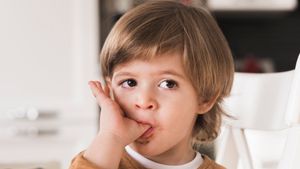YOGYAKARTA A number of psychologists investigate how emotions in children are compared to adults. As it turns out, this investigation is not yet complete, but the emotional measurements of expert investigations are reliable. That is, although it can be said that children seem to have stronger emotions, adults actually have the same strong emotions. However, adults can better manage reacting to their emotions. Even adults can hide or manipulate the emotions they feel.
According to the findings of students who studied Ph.D. in Clinical Psychology, Affective Neuroscience and Development Lab., Harvard University, found overall that the intensity of emotions decreased steadily from 4 to 25 years old. Previous research marks an age of decreasing emotional intensity at the age of 10 to 14 years. These findings suggest that children, adolescents, and adults may have the same intense reaction when emotional situations are under control. However, it is possible that children and adolescents choose to enter an emotional situation compared to adults.
The above relates to how a person can regulate their emotions. Being able to regulate emotions means helping a person reduce emotional intensity. More than that, getting older, a person is better at managing their emotions. According to the findings of brain imaging, children can begin to develop emotional settings at the age of 5-11 years. Well, if adults are better able to regulate emotions than children and adolescents, it means they can reduce the intensity of their feelings.
In stages, children can only think about one-dimensional emotions. Unlike teenagers who can think about emotions in several dimensions, including assessing emotions theoretically, good and bad. In addition, children have less experience with the world. So new things can exacerbate emotional experiences. But the child's brain can actually prioritize new things so that they have the opportunity to feel high emotions and low emotions.
According to Kristen Lindquist, Associate Professor, Psychology and Faculty Science, North Carolina University explains that the difference in emotions between children and adults is both interesting and difficult to answer scientifically. At least in infants before being able to communicate verbally, we cannot ask directly about what they feel. More broadly, it's hard to know empirically whether your fear is the same as the fear of others. So it's difficult to measure the difference between the emotions of children and adults.
Even so, there are scientific reasons to believe that children's emotions are generally stronger than adults. First, children have a little experience in the world so that it exacerbates emotional experiences and has the opportunity for high and low emotions because they tend to look for new things than adults.
Second, children experience more intense emotions because they are less able to regulate emotions. Adults have the strength of an emotional vocabulary that is obtained with difficulty which helps them know what they feel in various contexts and what to do with those feelings. For example, when you feel uneasy about your superiors, you can identify those feelings as anger, bite the tongue, and express anger. Children who are very young do not yet have the ability to reflect themselves, and as time goes by they realize that certain feelings mean they feel certain emotions.
Launching Gizmodo, Sunday, September 3, the strength to regulate emotions is regulated by the prefrontal cortex which is fully mature until about 25 years of age. This part of the brain helps direct attention, leverage knowledge, and regulate behavior. Children are still dependent on adults to help them regulate emotions by labeling their feelings.
If children have caregivers who are proficient in taking emotional control measures, they can finally learn to regulate their own emotions. Therefore, recognizing children's abilities and providing examples of good emotional setting strategies can help them experience less intense emotions.
SEE ALSO:
That's the expert's explanation of the notion that children have stronger emotions than adults. However, some children may be wiser than their age. That means scientific findings about the reasons why children have stronger emotions than adults are not absolute.
The English, Chinese, Japanese, Arabic, and French versions are automatically generated by the AI. So there may still be inaccuracies in translating, please always see Indonesian as our main language. (system supported by DigitalSiber.id)


















